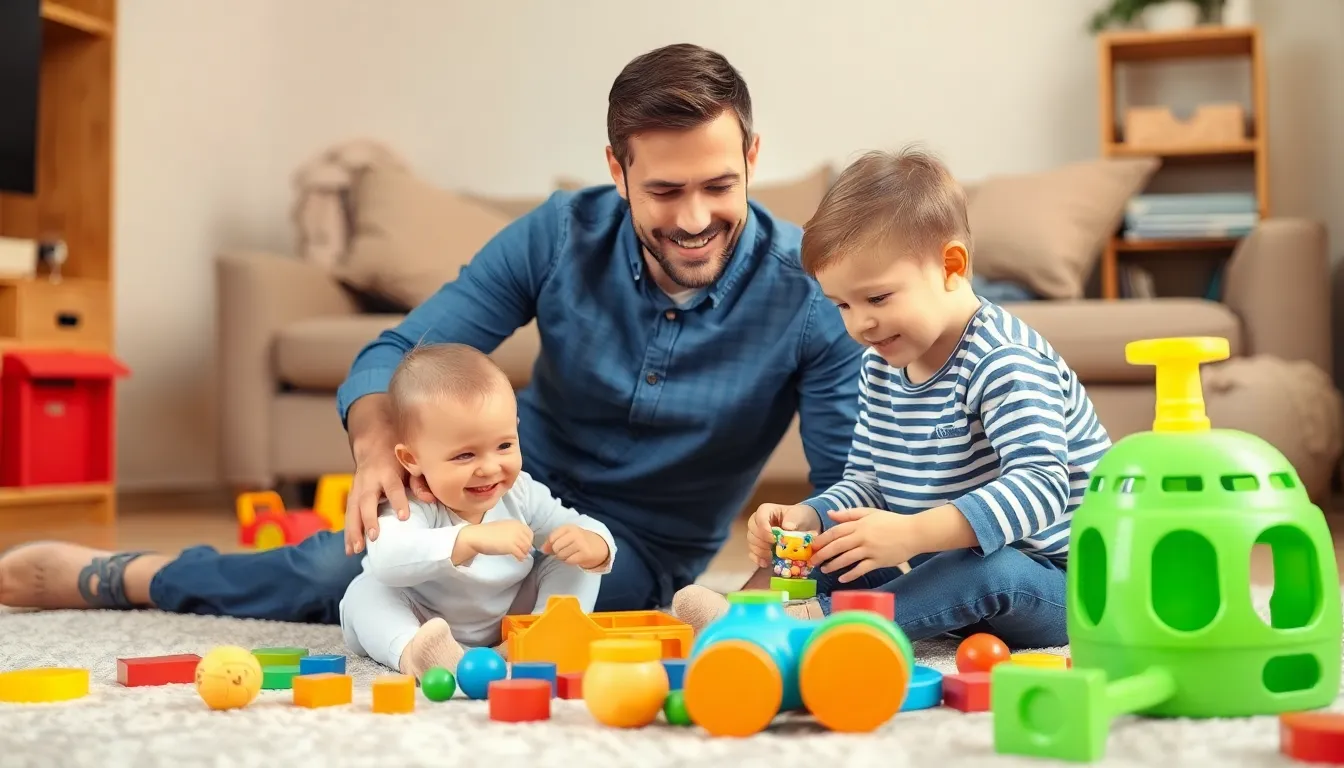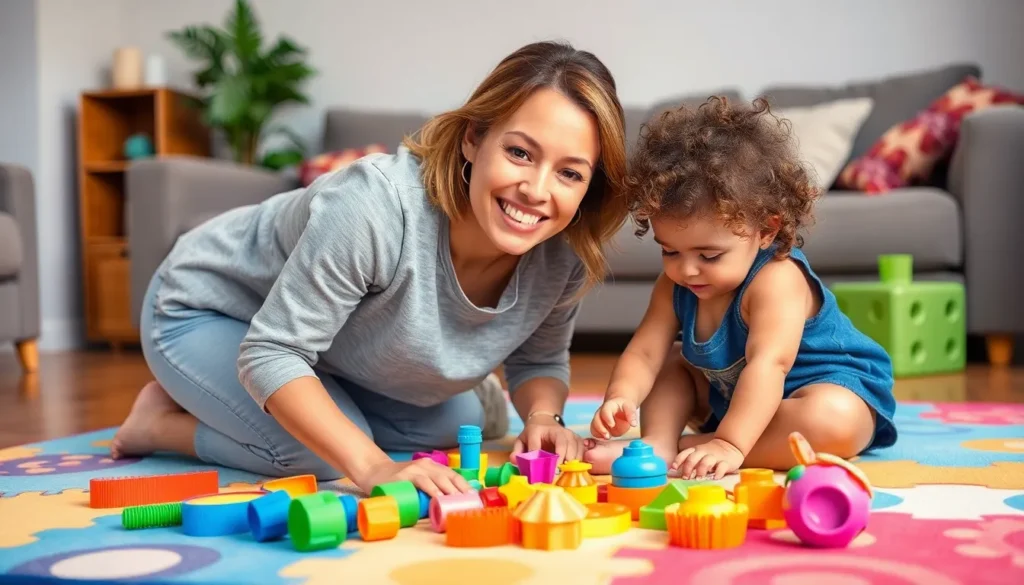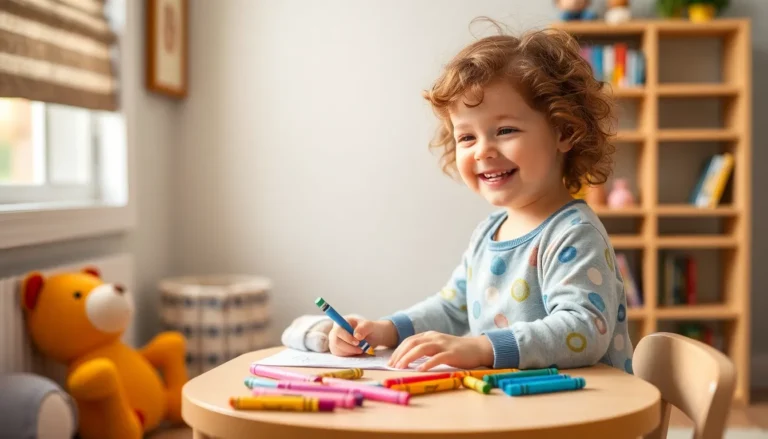Table of Contents
ToggleIn the wild world of toddlerhood, where every day feels like a new episode of a reality show, mindful parenting can be the secret ingredient to turning chaos into calm. Picture this: a serene oasis amidst the whirlwind of tantrums and toys strewn across the living room. It might sound like a fairy tale, but with a sprinkle of mindfulness, parents can navigate the ups and downs of raising little ones with grace and humor.
Understanding Mindful Parenting Toddlers
Mindful parenting involves being fully present with toddlers during interactions. This approach fosters stronger emotional connections. It encourages parents to respond thoughtfully rather than react impulsively.
Presence plays a crucial role in this parenting style. Observing a child’s behavior allows insight into their needs and feelings. Practicing patience helps in managing challenging situations, like tantrums.
Offering calm encouragement teaches toddlers to express emotions effectively. By modeling mindfulness, parents can help children develop self-regulation skills. Techniques like deep breathing can be introduced to calm both parents and toddlers.
Daily routines provide opportunities for mindful interactions. Engaging in activities without distractions fosters a shared experience. Focusing on the moment builds a sense of security and trust.
Setting aside specific times for one-on-one play promotes bonding. Toys that encourage creativity and problem-solving can enhance mindful play. These moments allow toddlers to explore emotions safely.
Understanding the chaos of toddlerhood also involves compassion for oneself. Parenting challenges often arise, and it’s crucial to acknowledge one’s feelings. Seeking support from other parents can provide valuable perspectives.
Mindful parenting doesn’t mean perfection. Embracing imperfections leads to growth for both parents and toddlers. Practicing mindfulness daily creates a balanced environment, where both can thrive.
Benefits of Mindful Parenting

Mindful parenting offers several advantages that can significantly enhance the parenting experience during toddler years.
Emotional Regulation
Emotional regulation becomes easier through mindful parenting. Parents who practice mindfulness cultivate awareness of their emotions, allowing them to respond thoughtfully. Tools like deep breathing and focus on the present moment help manage stressful situations. When chaos arises, parents can maintain composure, demonstrating regulated behavior to their toddlers. This modeling fosters resilience and emotional intelligence in children. Consistent practice enhances their ability to cope with frustrations, paving the way for healthier emotional responses.
Enhanced Parent-Child Bond
The parent-child bond strengthens through mindful interactions. Engaging fully with toddlers during play fosters mutual understanding. Children feel seen and valued when parents offer their complete attention. Focused interactions during daily routines promote meaningful experiences that deepen connections. This can lead to improved communication skills and trust. Ultimately, a strong parent-child bond nurtures a secure attachment, aiding children in navigating their emotions and relationships as they grow.
Techniques for Mindful Parenting
Mindful parenting techniques foster connection and emotional understanding during toddlerhood. These practices help create a nurturing environment.
Active Listening
Active listening builds trust between parent and child. A parent focuses on the toddler’s words, emotions, and body language, which encourages open communication. Reflective responses validate feelings, showing the child their emotions matter. Parents can ask clarifying questions, enhancing understanding and connection. Regularly practicing active listening helps toddlers feel heard. This approach reduces misunderstandings and builds a stronger emotional bond.
Practicing Presence
Practicing presence entails being fully engaged in the moment with the toddler. Parents can minimize distractions during interactions, creating a calm atmosphere. Focusing on the toddler allows for deeper connections and better emotional support. Simple activities like sharing a meal or playing together promote shared attention and connection. By recognizing and responding to a child’s needs promptly, parents demonstrate understanding. Maintaining awareness of one’s own feelings also contributes positively to the experience. Consistent practice enhances the overall parenting experience for both parent and child.
Challenges in Mindful Parenting
Mindful parenting involves several challenges that can make it difficult to remain fully present and engaged with toddlers.
Dealing with Distractions
Modern life brings distractions that interrupt meaningful interactions. Smartphones, television, and household chores often draw attention away from parenting moments. Parents must consciously set aside time for undistracted engagement. Simple acts like turning off devices during playtime can foster deeper connections. Emphasizing the importance of a calm atmosphere helps toddlers feel more secure. Creating a designated play area free from distractions supports mindfulness. Clarity during routines allows both parent and child to focus on one another. These strategies help establish richer interactions amidst daily chaos.
Managing Expectations
Parents often hold high expectations about their parenting journey. Imagining perfect scenarios can lead to unnecessary stress and disappointment. Each child’s uniqueness necessitates adapting strategies to fit their specific needs. Flexibility in approach encourages a more mindful attitude. Knowing that toddlers may throw tantrums or resist cooperation prepares parents for realistic interactions. Setting achievable goals enables parents to celebrate small victories along the way. Accepting imperfections and viewing challenges as opportunities for growth enriches the mindful parenting experience. Balancing aspirations with realism creates a supportive environment for both parents and toddlers.
Mindful parenting offers a transformative approach to navigating the challenges of raising toddlers. By fostering presence and emotional connection parents can create a nurturing environment that benefits both themselves and their children. Embracing techniques like active listening and minimizing distractions strengthens bonds and encourages emotional intelligence.
It’s essential to remember that this journey isn’t about perfection but about growth. By adapting to each child’s unique needs and maintaining flexibility parents can turn everyday interactions into meaningful experiences. With self-compassion and support from others the path of mindful parenting becomes a rewarding adventure that enriches family life.







